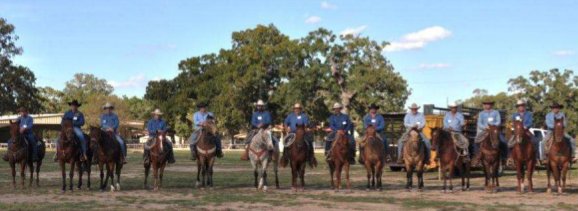
by Marion E. Altieri for Equine Info Exchange
Hurricanes, tornadoes and other life-altering natural disasters descended on your community. You and your family were totally unprepared—or thought that you’ve been ready for years. But either way—the storm struck with a viciousness of biblical proportions—and you were left with few resources, if any. The realization that all your livestock, including horses and cattle, have been lost, disoriented or hopelessly scattered—is almost more than your human soul can bear.
You were just about to give up, to bury your face in your hands as uncontrollable tears originated in your war-scarred soul and coursed down your muddied face. Everything for which you’ve worked your entire life—seems to be gone. Your beloved horses, your priceless cattle—are gone with the wind…literally.
And then, you see a vision. Your discouragement turns to hope as you see them, a team of cowboys and their horses. Arriving in pick-up trucks and horse trailers, or actually on horseback, the brave, dedicated members of The Horseback Emergency Response Team (H.E.R.T.) has arrived—and you realize that your life’s work and love may not be lost, after all. Indeed, there is hope because the great State of Texas has official channels for dealing with your monumental problems—and, through H.E.R.T., they will do all they can to help restore your life to normal.
So, how did these knights in chaps and Tony Lucheses end up here, helping you? Who organized these gentlemen astride their loyal horses, who go willingly into places that others (walking, vehicles, even helicopters)—cannot reach because of the nature of the destruction? Former Texas Animal Health Commission (TAHC) Executive Director, Dr. Dee Ellis, DVM, MPA, created H.E.R.T. in response to Hurricane Ike in 2008, when so many large animals’ lives were threatened, or ended, because there was no coordinated effort to rescue them.
The official press release that announced the formation of the team, states: “As part of the Texas Division of Emergency Management state response structure, the TAHC is designated as the lead state agency for animal issues in disasters. Launching this group of approximately 20 agency responders will enhance the state's capability to assist the citizens of Texas with animal issues during disasters.” According to Dr. Ellis, “…horses are one of the tools in their [team members’] toolbox.”
So—they’re not random, renegade cowboys, wandering the Texas floodplains, looking to do superhero work. These cowboy-heroes are actual members of TAHC, and they are called upon through official channels to volunteer their services whenever animals’ lives are threatened by catastrophic weather conditions.
In many ways, H.E.R.T. actually is quite like the mounted police in mega-cities like New York: highly-trained horses who are “bomb-proof,” going with their equally well-trained owner/riders into places that others cannot—or will not. Like the NYPD equine police officers, the H.E.R.T. equine team members must not be skittish, but be able to participate in the calming of a frightened horse or cow, as they herd their rescuees to safety.
Of course, not just anyone who owns a horse and can ride is trained to join the ranks of this elite squad: members are recruited and accepted because they are skilled at mapping, communications and working with first responders. They must have strong, working knowledge of horses, cattle and ranching. And of course, they must be secure in their riding skills: horse and rider must move as one unit, intuitively seeking, finding and rounding up animals in distress. Yes, there is a romantic notion, of cowboys on horseback, riding in to save the day.
That archetype has been part of the lore of America since the first be-chapped cowboy and his American Quarter Horse drove the first herd of cattle across the Great Plains.
But there’s nothing romantic about the hard work of dedicated hearts that is the domain of the Horseback Emergency Response Team. Their chaps and cowboy boots are not -costumes, or donned to set feminine hearts a-flutter: the burrs and cacti that they encounter demand that their legs and feet need protecting. Their hats are to guard against the hot Texas sun, after the hurricane’s assaulting rains have subsided.
These men are heroes, but not the stuff of mere mythology: they are valorous, gutsy, real-to-the-bone exemplars. They are as tough as Texas, and as tender as…the heart of Texas.
These valiant men are not the protagonists in a romance novel. They are real: courageous and devoted, they are the epitome of the strength, the soul, the very spirit of Texas. The Horseback Emergency Response Team represents not only hope for the weary victims of Hurricane Harvey—they are living, breathing reminders that Texas has grit and guts—and together—not only will they survive, they will thrive and come back, better than ever.
According to Thomas Swafford, Public Information Officer of the TAHC:
“…the H.E.R.T. is the only one of its kind in the United States. They are Texas to the core, and can’t wait to get in and help people.”
According to Dr. Ellis, the team’s willingness to help extends also to Louisiana, Mississippi, Alabama and Florida.
So, if YOU want to help H.E.R.T. to help horses, cows and the good people of Texas, please consider donating things that they actually need: hay and supplies. Here’s info on how to do that, directly. Thank you for helping, however you can.
Please call (979) 845-7800. Texas A&M Agrilife Extension is handling the donations and supply points.
The Texas Department of Agriculture has a Hay Hotline. (Remember, once the horses and cattle are rescued—they have to eat.)
If you’d like more information, please contact Texas Animal Health Commission’s Thomas Swafford, or Executive Director, Dr. Andy Schwartz, DVM: (800) 550-8242
Texas Animal Health Commission
Find out more about them online at https://www.tahc.texas.gov

































